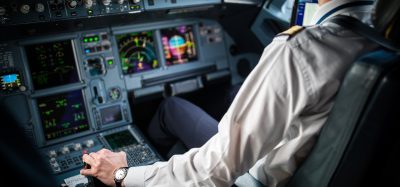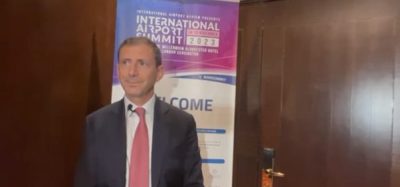Clarity and simplicity
- Like
- Digg
- Del
- Tumblr
- VKontakte
- Buffer
- Love This
- Odnoklassniki
- Meneame
- Blogger
- Amazon
- Yahoo Mail
- Gmail
- AOL
- Newsvine
- HackerNews
- Evernote
- MySpace
- Mail.ru
- Viadeo
- Line
- Comments
- Yummly
- SMS
- Viber
- Telegram
- Subscribe
- Skype
- Facebook Messenger
- Kakao
- LiveJournal
- Yammer
- Edgar
- Fintel
- Mix
- Instapaper
- Copy Link
Posted: 7 February 2012 | Mark Glover, Commissioning Editor, International Airport Review | No comments yet
As the SESAR initiative continues to garner debate from all corners of the aviation industry, Mark Glover from International Airport Review spoke to one of the key players involved with the initiative, Guenter Martis, Director of European Affairs at CANSO, to see what needs to be done by all involved to push the project forward.
Mark Glover: What do stakeholders need to do in 2012 to build momentum for SESAR?
Guenter Martis: They have to work together and need to come out of their corners where they have been sitting very comfortably, now it is time to commit fully to this project. We all need to work together with the European Commission to get this very important project done. We need to work on the communication of the Commission and we need to achieve a single industry voice, otherwise it will fail.
As the SESAR initiative continues to garner debate from all corners of the aviation industry, Mark Glover from International Airport Review spoke to one of the key players involved with the initiative, Guenter Martis, Director of European Affairs at CANSO, to see what needs to be done by all involved to push the project forward.
Mark Glover: What do stakeholders need to do in 2012 to build momentum for SESAR?
Guenter Martis: They have to work together and need to come out of their corners where they have been sitting very comfortably, now it is time to commit fully to this project. We all need to work together with the European Commission to get this very important project done. We need to work on the communication of the Commission and we need to achieve a single industry voice, otherwise it will fail.
MG: What role does the European Commission have in the process?
GM: They have to keep everyone’s strength up and to take the lead within the process. So far, they have done a good job with general communication but they have a challenge with the interests of the joint undertaking, as well as trying to merge EUROCONTROL. All stakeholders have specific interests but what is necessary in these times, when everybody is closer to their own business than the rest of the world, is to think pragmatically, be target orientated and focused on what we want to achieve. The Commission is focused on the industry playing a leading role in the deployment management of the project and I fully agree with their stance, as it is aligned with the position that we (CANSO) express. SESAR is a European Union project and it cannot be just ‘triggered’ by strong wording in the communication, but the process needs then to be followed with clear leadership during the development of guidelines by consulting with the appropriate industry players.
MG: How important are airports in this whole project? GM: Airports are definitely one of the major players, together with the airlines and the ANSPs, they are the network users, so we need to have them on board. The network users have to agree on how to set up the deployment manager, supported by EUROCONTROL and the manufacturing industry.
MG: What will be CANSO’s main priorities in 2012?
GM: We continue to consolidate the views of our members as well as creating consolidated positions where necessary, as well as providing a platform for our members with our industry partners. At CANSO we will be asking the airports and airlines more than ever to work productively with us. We (CANSO) don’t want to take the lead in everything; we want the likes of the airports and airlines to step forward to achieve a common view on the structure of the deployment management. If we can agree on that then we will get the political support which is necessary to get the appropriate funding.
MG: It seems that the airlines are rather reluctant to get involved with SESAR, why do you think this is?
GM: It is not their core business, so why should they get involved? I can understand this. Why should they contribute to the development of an ATM structure as they only operate an airplane? On the other hand they are involved, as of course they have to pay for the right to fly. However, due to the transformation that they are currently going through as well as the economic climate, they have lost some of their expertise within this sector. Another factor is the number of different airspace user representative associations who are giving partly a split picture to the outside world of SESAR.
MG: What are the economic challenges facing SESAR in 2012?
GM: The member states of the European Union are concentrating on the economic crisis, so aviation now has a lower priority. We have proven to Europe with the experience we have, with the knowledge and details that we have provided over the past years to the political decision makers, the European Commission and the European Parliament, that aviation is necessary for the European economy and must also be seen as an integral part of a European transport strategy. This strategy is necessary to guarantee prosperity, development and competitiveness of Europe and is not something that could or should be forgotten. Aviation up to now has not been seen as an integral part of a European transport strategy, but it is the time to really consolidate this approach. The airlines are also fighting economic challenges, with the rocketing prices of fuel, as well as cutting costs on the staffing side. This ‘social’ side of the industry which is also being felt by ANSPs, will also be something that will have to be looked at and managed in the coming year with the appropriate priority.
MG: Realistically, where do you think SESAR will be this time next year?
GM: What we want to have achieved is a complete common understanding of the deployment management with the appropriate structure and processes, of where we want to go and a plan of how we will get there. We also need to know how the funding will be managed with this structure. An appropriate regulatory framework should be set into a preparation stage. This is something that we will have to keep a close eye on as it develops over the coming months with the development of the guidelines mentioned in the European Commission’s communication. The industry should be supported by a clear and simple regulatory framework, defining goals, roles and responsibilities. We have reached a state of play where to avoid change in the most diplomatic manner is simply a waste of time. Now we need to act and address the issues in a proper manner. We should not have to have fears of hurting one another; we need to do this together, open and constructively.
Biography
Guenter Martis joined CANSO as its Director European Affairs in 2009. Leading the Association’s European Regional Office, he represents ANSPs in Eurocontrol, the Industry Consultation Body, the SESAR Joint Undertaking Administrative Board, and co-chairs the EU Social Dialogue. He has over 30 years’ experience in the aviation industry. Before joining CANSO, he served as IATA’s European Director of Safety, Operations and Infrastructure and before that, he was General Manager Technical and Operations at AEA.

















